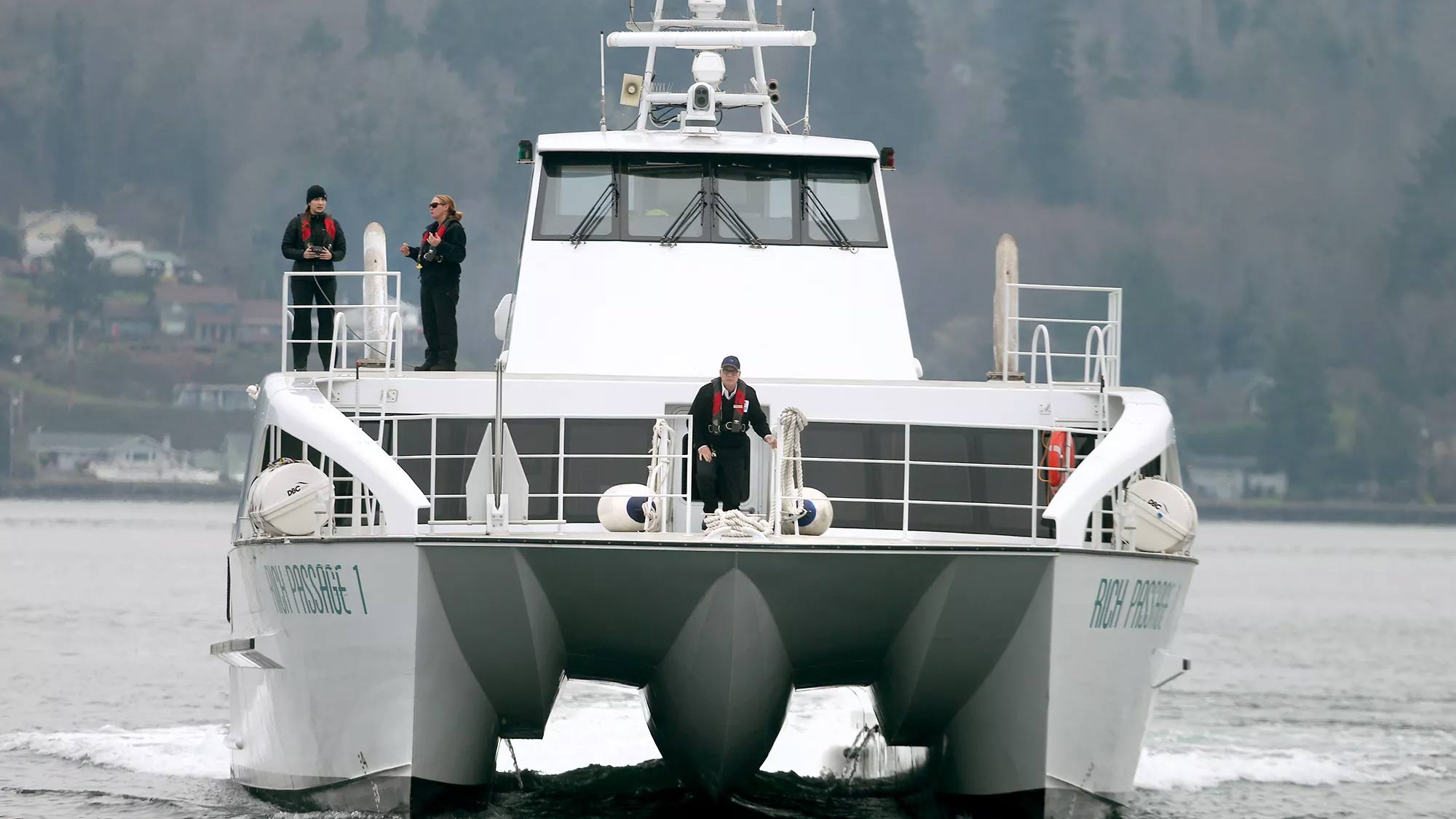BREMERTON — Kitsap Transit’s board of commissioners on Tuesday approved the purchase of two additional Rich Passage-class vessels, an agreement that will bring backup boats to the Bremerton route in the first part of 2019.
After months of negotiations, Kitsap Transit reached an agreement with Bellingham-based shipbuilder All-American Marine to start construction on the two vessels. The total price tag for both vessels is just over $15 million.
"This is kind of an exciting day for the fast ferry program, that we can get the additional RP-class boats under construction," Kitsap Transit executive director John Clauson said.
The contract means the Rich Passage 1, the foil-assisted catamaran that has been the sole vessel on Kitsap Transit’s fast ferry route to Seattle since last summer, will finally have some help. Kitsap Transit has been using Washington State Ferries as a de facto backup since service began.
The two vessels (which are being called RP2 and RP3 for now) will be structurally similar to RP1, with a 118-passenger capacity and composite hydrofoil to help minimize wake. But RP2 and RP3 have been designed to be quieter, with changes to the exhaust and HVAC systems and other minor modifications.
Both vessels will have a “wet exhaust” system, which uses water to cool the engines. The system should be quieter than the RP1, which has smokestacks that run up and through the cabin. The vessels will also feature a built-in HVAC system for better ventilation — the RP1 had to have air-conditioning installed after service began.
The agency is also exploring moving some electronic controls that can be exposed to water into the cabin. Some riders complained about the bicycle racks on the back of the boat, which will be changed to accommodate disc brakes.
The biggest boon to Kitsap Transit, though, is having a backup vessel in case something goes wrong.
Initially meant as a research vessel to study the effects of wake damage on the shorelines of Rich Passage, the RP1 was pressed into service in July 2017 after voters approved fast ferry service. The vessel, which was stored in dry dock for five years, experienced frequent mechanical breakdowns in the first few months of service.
"We're all pretty excited around here and will all feel much more comfortable having backup boats available," Kitsap Transit’s marine service director Darrell Bryan said.
The deadline for the first vessel is Jan. 15, 2019. The second boat is due to be completed April 15, 2019. Kitsap Transit’s contract with All-American Marine includes bonuses and penalties up to $100,000 for early or late completion.
Both vessels will go through sea trials before being put into service to make sure they meet low-wake and low-noise standards.
The transit board voted unanimously to approve the agreement.
Poulsbo mayor and board member Becky Erickson, a strong opponent of the fast-ferry proposal when it was on the ballot, said she would support the effort because voters had approved it.
“Until they tell us to do something else, we're building a ferry system in Kitsap County,” Erickson said.
Board members highlighted the need for a backup until the RP2 and RP3 are finished. Kitsap Transit is still trying to reach an agreement with King County Marine Division to use its backup boat, the Spirit of Kingston.
“There's no more room, there's a capacity issue in the I-5 corridor and there's other communities having the same conversations,” county commissioner Robert Gelder said. “Hopefully folks will learn as we sort of are treading the water first, so to speak.”
Reservation system consultant
The transit board also approved hiring a consultant to review the fast ferry’s reservation system. Board members had asked for a more specific scope of work before voting.
Kitsap Transit will go out to bid for a consultant that will review Kitsap Transit’s current reservation system and look elsewhere for a program that might better fit the agency’s needs, Clauson said.
The consultant will either recommend a better system for Kitsap Transit or suggest the agency build its own from the ground up. Kitsap Transit’s current vendor, RocketRez, is supposed to fix several problems with the system before March.
Board members were split on the idea of a reservation system, which wasn’t strictly advertised by Kitsap Transit before the ballot measure in November 2016 but was mentioned in public meetings, Clauson said.
“Frankly I consider it a frosting service, in other words, we need to concentrate on getting the boats working and really making sure the routes are going effectively,” Erickson said. “And then when we have long-term capacity issues, then we start talking reservations.”
Bremerton Mayor Greg Wheeler and county commissioner Ed Wolfe joined her in questioning whether the service needed a reservation system.
Other board members pointed out that riders are more likely to shift modes of travel if they can get a guaranteed spot on the boat, and a different system may improve reservations in the future.
After a vote, the board decided to add the feasibility of a reservation system to the list of tasks for the consultant.
"I think this is going to give us some information to where we can make a decision on whether to implement reservation system or not," Wheeler said.


